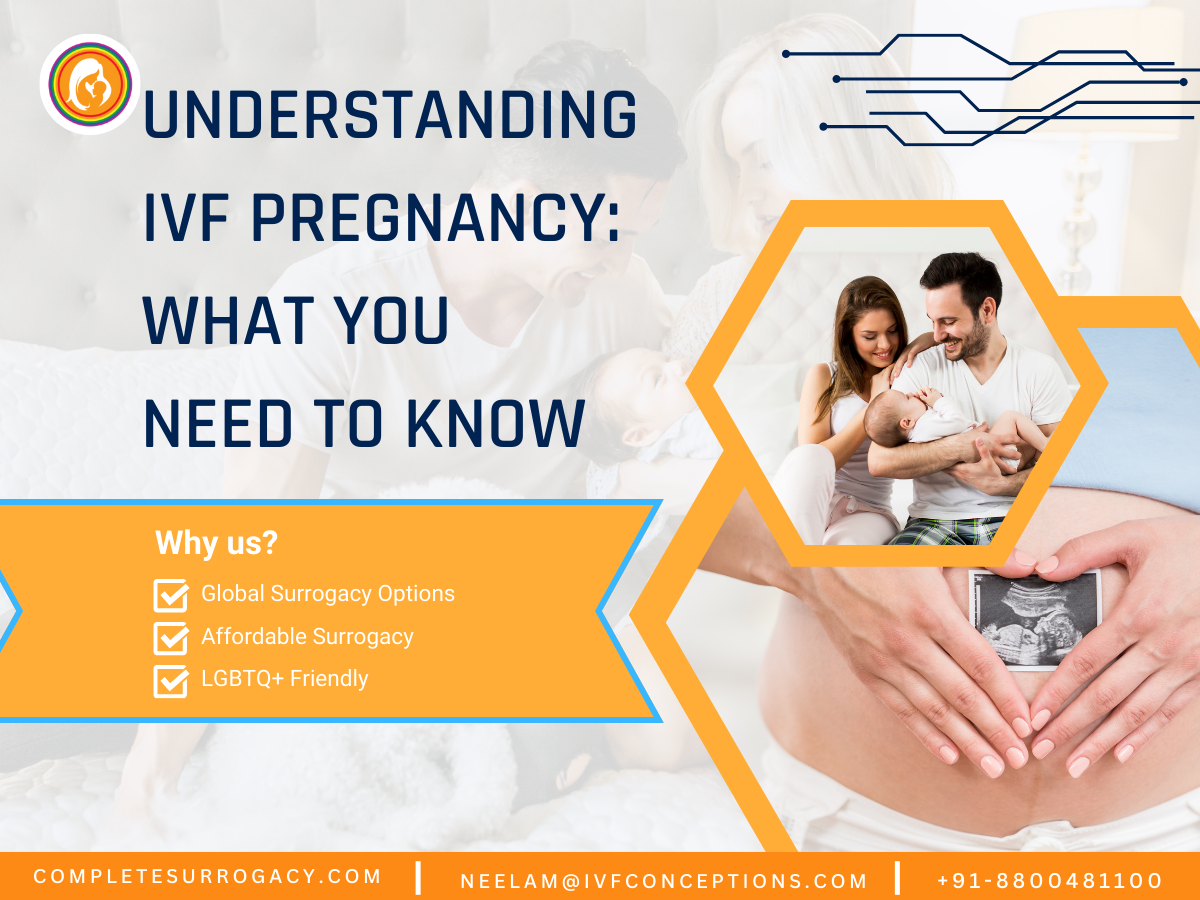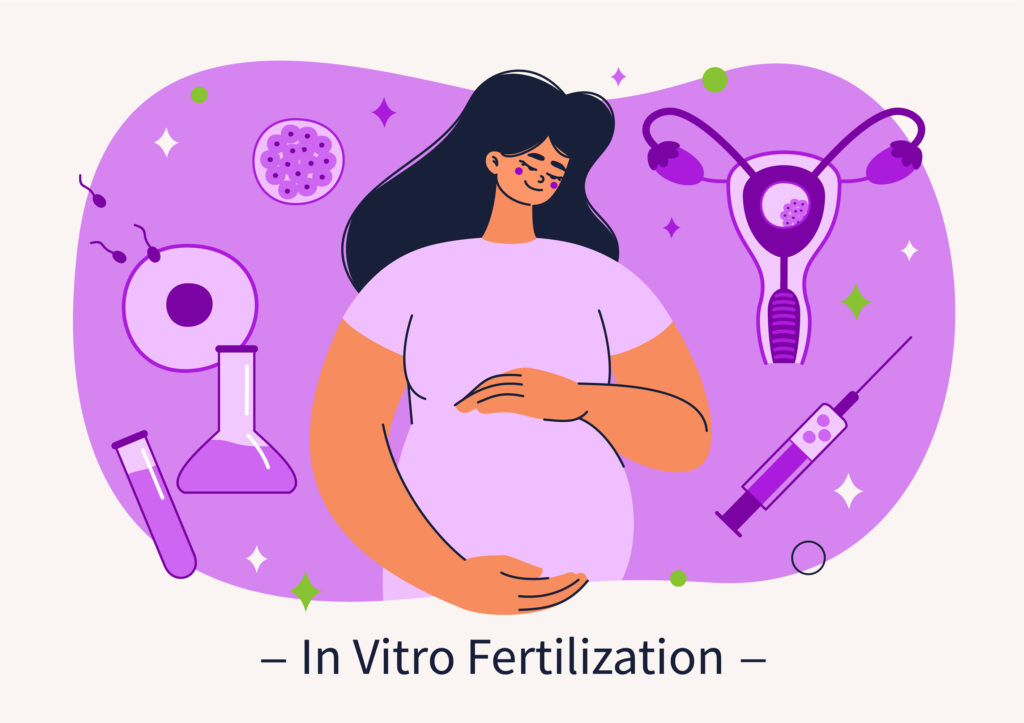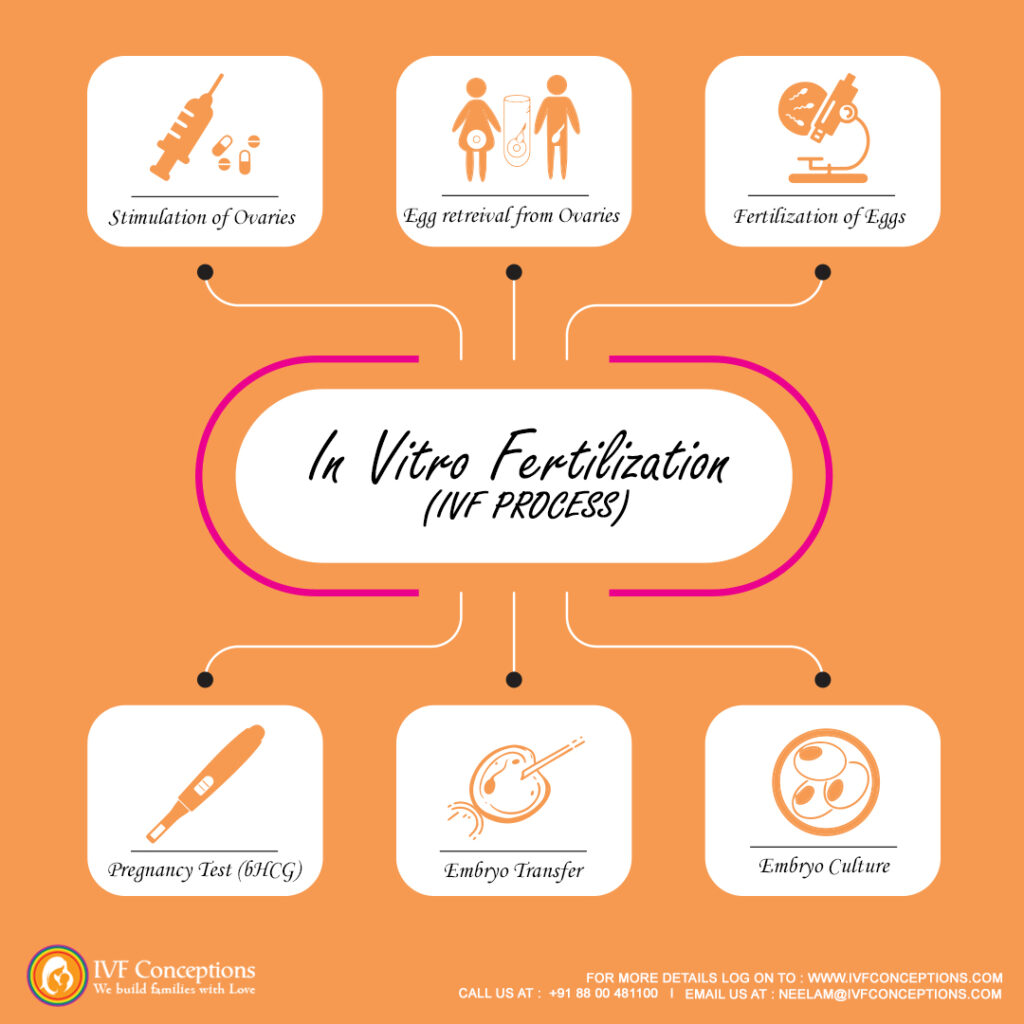Understanding IVF Pregnancy: What You Need to Know

Understanding IVF Pregnancy: Process, Success Rates & Risks
Did you know that In Vitro Fertilization (IVF) has helped millions of couples overcome infertility and achieve parenthood? This advanced fertility treatment is a widely chosen option for those facing reproductive challenges or seeking to prevent genetic disorders in their children.
If you’re considering IVF treatment, it’s essential to understand the IVF pregnancy process, success rates, and potential risks. Factors like maternal age, embryo quality, and overall health play a crucial role in determining IVF success. With continuous advancements in assisted reproductive technology (ART), the chances of a successful pregnancy have significantly improved.
- Book an online appointment: Get a free online consultation.
- Call\W:+91-8800481100 Email:[email protected]
By gaining a deeper understanding of how IVF works, the associated risks, and the latest medical breakthroughs, intended parents can make informed decisions on their fertility journey and maximize their chances of a healthy pregnancy through IVF.
Key Takeaways
- IVF is a fertility treatment that involves fertilizing mature eggs with sperm in a laboratory and then transferring the resulting embryo(s) into the uterus.
- IVF can help individuals and couples overcome infertility issues and prevent the transmission of genetic disorders.
- The success rate of IVF is influenced by various factors, including the patient’s age and the cause of infertility.
- IVF carries a higher risk of multiple pregnancies, which can lead to complications like preterm birth and low birth weight.
- Individuals undergoing IVF may need to take hormonal medications to stimulate egg production and prepare the uterus for embryo transfer.
More Resources To Read:
9 Factors To Improve IVF Pregnancy Rate
How To Choose Between IVF and IUI: A Comprehensive Guide
IVF With Egg Donor Success Rates
What is Mitochondrial Donation IVF Treatment
Overview of IVF Pregnancy
In vitro fertilization (IVF) is a major breakthrough in assisted reproductive technology. It has changed the path to parenthood for many couples and individuals facing infertility. This detailed process can lead to a successful pregnancy, bringing hope to those who have struggled to conceive naturally.
What is In Vitro Fertilization (IVF)?
IVF is a fertility treatment that mixes an egg and sperm in a lab. First, mature eggs are taken from the ovaries. Then, they are combined with sperm to create embryos. These embryos are chosen carefully and put into the uterus, where they might grow into a healthy pregnancy.
How IVF Works

The IVF process has several steps, like ovarian stimulation, egg retrieval, fertilization, embryo culture, and embryo transfer. The success of IVF depends on many things, such as the woman’s age, infertility cause, and overall health.
In the U.S., IVF has a success rate of about 30% per cycle for women under 35. This rate drops as women get older. Yet, IVF is a widely used and successful way to beat infertility. It helps many couples and individuals achieve their dream of having a family.
Reasons for Pursuing IVF Pregnancy
IVF is a key solution for those facing fertility issues. It helps individuals and couples dealing with infertility or genetic disorders. It also aids in preserving fertility, letting people protect their ability to have children.
- Infertility Causes and IVF
About 1 in 8 couples in the U.S. face infertility. Issues like fallopian tube damage, ovulation problems, and male infertility are common causes. IVF can overcome these issues, making it easier to conceive.
- Preventing Genetic Disorders
IVF helps prevent genetic disorders by using preimplantation genetic testing (PGT). This method selects healthy embryos. It lowers the risk of passing on genetic diseases to the child.
- Fertility Preservation
IVF is crucial for those undergoing treatments that could harm their fertility, like cancer therapy. It allows for the freezing of eggs or embryos. This way, they can still have a family later, even after treatments.
IVF can change lives for those facing infertility, genetic disorders, or fertility loss. Knowing the reasons for IVF helps you make the right choice. It’s a step towards achieving your dream of having a family.
What Is IVF Pregnancy?
IVF (In Vitro Fertilization) pregnancy happens when a pregnancy comes from the in vitro fertilization process. In this process, eggs are taken from the ovaries and mixed with sperm in a lab. Then, one or more embryos are put into the woman’s uterus to grow into a pregnancy.
IVF can use a couple’s own eggs and sperm, or it might use donor eggs, sperm, or embryos. Sometimes, a gestational carrier is used, where the embryo is placed in another woman’s uterus.
IVF Pregnancy Considerations

Here are some risks and things to think about with IVF pregnancy:
- Stress – The IVF process can be hard on couples, both physically and emotionally.
- Complications from the egg retrieval procedure – This process might cause bleeding, infection, or harm to other organs.
- Ovarian hyperstimulation syndrome (OHSS) – A rare but serious issue that happens when ovaries get too stimulated during IVF treatment.
- Miscarriage – IVF pregnancies might have a higher risk of miscarriage than natural ones.
- Ectopic pregnancy – This is when a pregnancy grows outside the uterus, which can be dangerous.
- Multiple pregnancy – IVF can lead to having twins or triplets, which adds more risks.
- Birth defects – IVF might slightly increase the risk of certain birth defects, but the risk is still low overall.
The cost of one IVF cycle is about $12,000 to $17,000. The success rate of IVF depends on things like the mother’s age, past births, and if only one embryo is transferred.
“Reducing the number of embryos transferred did not significantly impact the pregnancy rate, contrary to the findings post-legislation in Quebec, emphasizing the importance of basing medical practices on solid data rather than personal judgment.”
IVF pregnancy gives hope to those facing infertility. But, it’s key to know the risks and things to consider.
The IVF Process Step-by-Step

If you’re thinking about in vitro fertilization (IVF) to start a family, knowing the steps is key. The IVF process has several important steps. It can take different amounts of time, but it usually follows a set order.
1. Ovarian Stimulation
The first step is ovarian stimulation. You’ll get fertility drugs to make your ovaries produce many eggs. This helps increase the chances of a successful egg retrieval and fertilization.
2. Egg Retrieval and Fertilization
When the eggs are ready, a small surgery called egg retrieval takes place. Your doctor uses ultrasound to take the eggs from your ovaries. Then, the eggs meet sperm in a lab to start fertilizing.
Sometimes, a method called intracytoplasmic sperm injection (ICSI) is used. It means one sperm is put directly into the egg. This is helpful if you have few or low-quality sperm.
3. Embryo Transfer
After fertilization, the embryos are checked and chosen for transfer. Usually, one or two embryos are put into your uterus to try to get pregnant. Any good embryos left might be frozen for later use.
The embryo transfer is a simple process, like a pap smear. You’ll wait about two weeks before testing to see if you’re pregnant.
Remember, IVF can be complex and might take more than one cycle to work. Success rates depend on your age, fertility history, and the clinic’s skill. Knowing the steps of IVF can make you feel more ready and informed on your fertility path.
Risks and Considerations of IVF Pregnancy

IVF is a common and effective way to help with infertility. But, it has some risks and things to think about. Knowing these can help you make good choices and get ready for a successful IVF pregnancy.
A big risk of IVF is ovarian hyperstimulation syndrome (OHSS). This happens in less than 1% of women getting IVF and can cause serious problems like fluid in the belly and lungs, blood clots, and kidney failure. There’s also a small chance of severe pelvic infection after egg retrieval or embryo transfer. This might need hospital care and antibiotics.
Thinking about birth defects is important too. Most people have a 2%-3% chance of birth defects. For infertile people, this might be a bit higher because of delayed conception and infertility causes. Using intracytoplasmic sperm injection (ICSI) with IVF might also raise the risk of birth defects and certain chromosome issues in the sperm.
Other risks include ectopic pregnancy, which is about 1% likely, similar to women with infertility history. Miscarriage rates vary, from 15% in women in their 20s to over 50% in women in their 40s. IVF also increases the chance of multiple births, which can cause problems like high blood pressure, pre-eclampsia, and premature labor.
IVF is a big step that costs time and money. But, it’s important to know that success rates differ for everyone. You might need more than one cycle to get pregnant. IVF can also be an option for same-sex couples or people wanting to save their fertility.
Talking about the risks and things to think about with your doctor is key. They can give you advice that fits your situation best.
| Potential IVF Risks | Likelihood |
| Ovarian Hyperstimulation Syndrome (OHSS) | Less than 1% |
| Severe Pelvic Infection | Uncommon, but may require hospitalization |
| Birth Defects | Slightly higher than general population |
| Ectopic Pregnancy | Around 1%, similar to infertile women |
| Miscarriage | 15%-50% depending on maternal age |
| Multiple Births | Higher risk, can lead to complications |
More Resources To Read:
Surrogacy Guide for Surrogate Mothers
Surrogacy Guide for Intended Parents
How does the surrogacy process work
Conclusion
IVF is now a key option for those wanting to start a family. It has a success rate of 50-72% per cycle, helping many overcome infertility. Yet, it comes with risks like multiple births and ovarian hyperstimulation.
Despite these risks, IVF greatly increases the chances of a healthy pregnancy and birth. Knowing the steps of IVF helps people decide if it’s right for them. Thanks to new techniques and expert fertility care, more people are achieving their dream of having a family.
Choosing IVF is a personal decision. People should think about the pros, cons, and costs before starting. With the right support from healthcare providers, couples can move forward with confidence towards their family goals.
Our team has over 14 years of experience facilitating surrogacy arrangements, egg donation, and serving as an advocacy resource for infertile couples and LGBTQ individuals seeking to build families. Till now we have helped and supported thousands of the intended parents with their family-building journey, and we can help you as well. Happy to share the references from the past IPs if needed.
If you’d like to learn more about IVF, Egg Donation, or surrogacy services globally, check out the rest of our website at Complete Surrogacy Agency. We offer legally secure and affordable surrogacy consulting services for FREE.
For more resources on IVF and Surrogacy, browse our other web page- IVF Conceptions.
For more resources on IVF and Surrogacy, browse our other web page- Georgia Surrogacy Agency.
Complete Surrogacy: Your Trusted Partner in International Surrogacy
At Complete Surrogacy, we have over 15 years of experience in international surrogacy, guiding 4,000+ intended parents worldwide. We provide safe, ethical, and affordable surrogacy solutions for single parents, LGBTQ+ couples, and heterosexual couples.
As members of EFS and ESHRE, we adhere to the highest ethical and professional standards. Our expert team is committed to providing accurate, compassionate, and transparent guidance, ensuring a legally secure and smooth journey to parenthood.
Let us help you build your family with trust, care, and integrity.
Get in touch for one FREE Surrogacy Consultancy!

FAQs for What is in vitro fertilization
What is in vitro fertilization (IVF)?
IVF is a process that helps people have a baby. It starts with taking mature eggs from the ovaries. Then, these eggs are mixed with sperm in a lab to create embryos.
After that, one or more embryos are placed in the uterus. This is where the baby grows. IVF is the top choice for fertility treatments that involve handling eggs or embryos and sperm.
What are the reasons for pursuing IVF pregnancy?
IVF helps people who can’t get pregnant after trying for a year. It’s an option if you or your partner has health issues like fallopian tube damage or problems with ovulation. Issues like endometriosis, uterine fibroids, or sperm problems also make IVF a choice.
IVF can also be used if you’re at risk of passing a genetic disorder to your child. It’s a way to save fertility for people about to start cancer treatments. Eggs can be frozen for later use during these treatments.
What is an IVF pregnancy?
An IVF pregnancy comes from the in vitro fertilization process. First, eggs are taken from the ovaries and mixed with sperm in a lab. Then, one or more embryos are put into the uterus.
Here, they might implant and grow into a pregnancy. IVF can use a couple’s eggs and sperm or donor eggs, sperm, or embryos. Sometimes, a gestational carrier is used for IVF pregnancy too.
What are the steps in the IVF process?
The IVF process has several steps. First, there’s ovarian stimulation. Then comes egg retrieval, followed by egg fertilization.
Finally, there’s embryo transfer.
What are the risks and considerations of IVF pregnancy?
IVF can lead to health issues, both short-term and long-term. These include stress, problems from the egg retrieval, and ovarian hyperstimulation syndrome. There’s also a risk of miscarriage, ectopic pregnancy, and multiple pregnancy.
Birth defects might be slightly more common too. IVF can be costly and time-consuming, with the need for multiple cycles for success. Success rates vary by individual factors.
Source Links
- In vitro fertilization (IVF) – Mayo Clinic
- IVF (In Vitro Fertilization): Procedure & How It Works
- What Is In-Vitro-Fertilization (IVF)?
- All about IVF
- Infertility and In Vitro Fertilization

Author Bio: Neelam Chhagani is an International Surrogacy Expert with 15 years of experience in the fertility and surrogacy domain. As the founder of IVF Conceptions and Complete Surrogacy, she has guided over 4,000 intended parents worldwide on their surrogacy journey to parenthood. Recognized as a trusted authority, she specializes in holistic infertility solutions and third-party reproduction consulting.
Holding an MA in Counselling Psychology and a PGD in Mental Health, Neelam is a proud member of the European Fertility Society (EFS) and the European Society of Human Reproduction and Embryology (ESHRE). She is also a leading surrogacy blogger, providing valuable insights into ethical and practical surrogacy solutions.
Since 2010, committed to supporting ALL family types, Neelam has been passionate about helping intended parents grow their families with compassion, integrity, and a focus on secure and affordable surrogacy options Globally.
Learn more about Neelam:
https://www.ivfconceptions.com/neelam-chhagani-surrogacy-consultant/
https://www.linkedin.com/in/neelam-chhagani-92892229/
https://www.quora.com/profile/Neelam-Chhagani















I was introduced to Neelam by a friend who worked with Neelam for surrogacy. Neelam is absolutely wonderful. I am a single male and the journey to fatherhood is not that easy. Neelam connected me to a program ideal for my circumstances. She was with me throughout the pregnancy providing advice and guidance along the way. I am so grateful I found her and am thrilled today that I have a beautiful daughter. I highly recommend Neelam to anyone who is on a journey to become a parent. Having a child has changed my world for the better. I wish others success with their own journey and recommend you connect with Neelam to find a path that is best for you.
SA (USA)